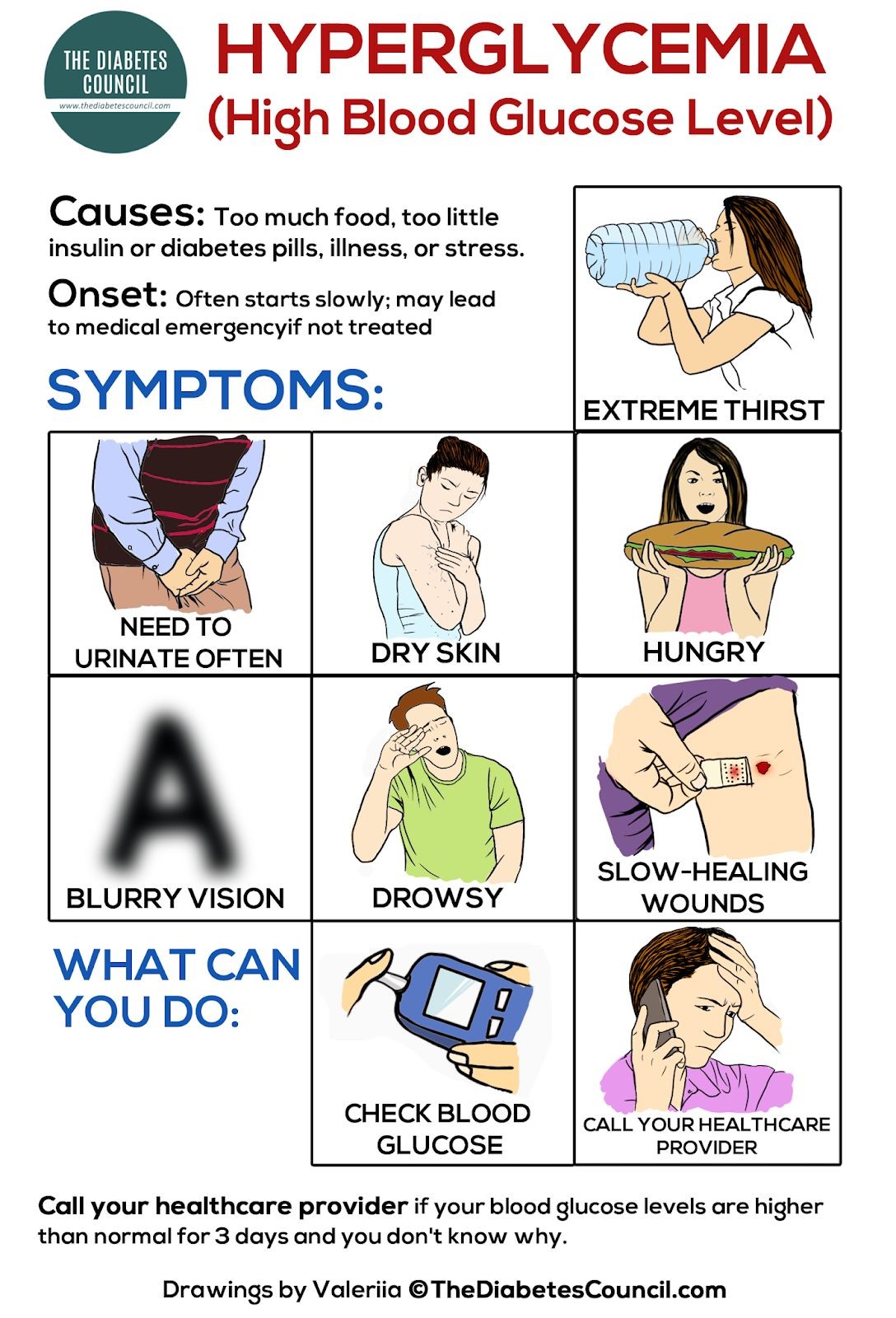
Contents
10 High Blood Sugar Symptoms (Hyperglycemia)
Hyperglycemia is the medical term for high blood sugar levels. Blood sugar is measured using a sample of blood taken from a vein or a small finger stick. It can be measured in a laboratory or with a handheld glucometer, a device that allows frequent monitoring without a doctor’s visit.
High blood sugar is a sign of diabetes (both type 1 and type 2) and prediabetes. Normal blood glucose ranges can vary slightly among labs, but generally, a fasting glucose level is considered normal if it is between 70-100 mg/dL. Glucose levels may rise slightly after a meal. Random blood glucose measurements are usually below 125 mg/dL.
| 6.5% or above | 126 mg/dL or above | 200 mg/dL or above | 200 mg/dL or above |
| 5.7 – 6.4% | 100 – 125 mg/dL | 140 – 199 mg/dL | N/A |
| Below 5.7% | 99 mg/dL or below | 140 mg/dL or below | N/A |
10 Symptoms and Signs of High Blood Sugar
The main symptoms of high blood sugar are increased thirst and frequent urination.
Additional symptoms that can occur with high blood sugar include:
- Headaches
- Tiredness
- Blurred vision
- Hunger
- Trouble thinking or concentrating
- Frequent urination
Other symptoms and signs of high blood sugar include:
- Sunburns. Pain from a sunburn increases blood sugars.
- Coffee. Some people with diabetes have extra sensitivity to caffeine.
- Gum disease. A complication of diabetes that can raise blood sugars.
- Losing sleep. Going without sleep can cause the body to use insulin less efficiently.
Nose spray. Certain nasal sprays trigger the liver to make more blood sugar.
Severely elevated blood sugar levels can lead to a medical emergency ("diabetic coma"). This can occur in both type 1 and type 2 diabetes. Type 1 diabetes may cause diabetic ketoacidosis (DKA), and type 2 diabetes may cause hyperglycemic hyperosmolar nonketotic syndrome (HHNS). These hyperglycemia crises are serious and life-threatening if not treated immediately. Hyperglycemic crises cause about 2,400 deaths annually in the U.S.
Over time, high blood sugar can damage organs and tissues. Long-term high blood sugar can impair the immune response, leading to poor wound healing. It can also cause nerve damage, vision problems, and damage to blood vessels and kidneys.
Causes of High Blood Sugar
Diabetes mellitus is the most common cause of hyperglycemia. Diabetes affects over 8% of the U.S. population. In diabetes, blood glucose levels rise due to insufficient insulin in the body or the body’s inability to use insulin effectively. Normally, the pancreas releases insulin after a meal to allow the body’s cells to use glucose for fuel, keeping blood glucose levels normal.
Type 1 diabetes accounts for about 5% of diabetes cases and results from damage to the insulin-secreting cells of the pancreas. Type 2 diabetes is more common and is related to the body’s ineffective use of insulin. Gestational diabetes is a form of diabetes that occurs during pregnancy.
Other medical conditions can also cause high blood sugar, including:
- Pancreatitis (inflammation of the pancreas)
- Pancreatic cancer
- Hyperthyroidism (overactive thyroid gland)
- Cushing’s syndrome (elevated blood cortisol levels)
- Tumors that secrete hormones, such as glucagonoma, pheochromocytoma, or growth hormone-secreting tumors
- Severe stresses on the body, such as heart attack, stroke, trauma, or severe illnesses, can temporarily lead to high blood sugar
- Taking certain medications, including prednisone, estrogens, beta-blockers, glucagon, oral contraceptives, phenothiazines, and others, can increase blood glucose levels
Diagnosing High Blood Sugar
There are several blood tests that can diagnose high blood sugar, including:
- Random blood glucose: Measures blood sugar at a specific time. Normal values are generally between 70 and 125 mg/dL.
- Fasting blood glucose: Measures blood sugar after fasting overnight. Normal fasting levels are less than 100 mg/dL. Levels above 100 mg/dL suggest prediabetes, while levels of 126 mg/dL or above indicate diabetes.
- Oral glucose tolerance test: Measures blood glucose levels at specific intervals after consuming sugar. Most commonly used to diagnose gestational diabetes.
- Glycohemoglobin A1c: Measures glucose bound to red blood cells and provides an indication of blood sugar levels over the past 2 to 3 months.
Subscribe to MedicineNet’s Diabetes Newsletter
By clicking "Submit," I agree to the MedicineNet Terms and Conditions and Privacy Policy. I also agree to receive emails from MedicineNet and understand that I may opt out of subscriptions at any time.
Treatment for High Blood Sugar
Mild or transient hyperglycemia may not require medical treatment, depending on the cause. People with mildly elevated glucose or prediabetes can often lower their levels through diet and lifestyle changes. Discuss any changes with healthcare professionals or use reliable resources like the American Diabetes Association.
Insulin is the treatment of choice for people with type 1 diabetes with life-threatening increases in glucose levels. People with type 2 diabetes may manage their condition with a combination of oral and injectable medications, sometimes including insulin.
High blood sugar due to medical conditions other than diabetes is generally treated by addressing the underlying condition. In some cases, insulin may be needed to stabilize glucose levels during treatment.
Dangers and Complications of High Blood Sugar
Prolonged hyperglycemia or high blood sugar can lead to severe long-term complications, especially when poorly controlled in diabetes. These complications develop slowly over time.
Complications of high blood sugar in poorly controlled diabetes include:
- Heart and blood vessel disease, increasing the risk of heart attack, stroke, and peripheral artery disease
- Poor kidney function eventually leading to kidney failure
- Nerve damage causing burning, tingling, pain, and changes in sensation
- Eye diseases, including damage to the retina, glaucoma, and cataracts
- Gum disease


